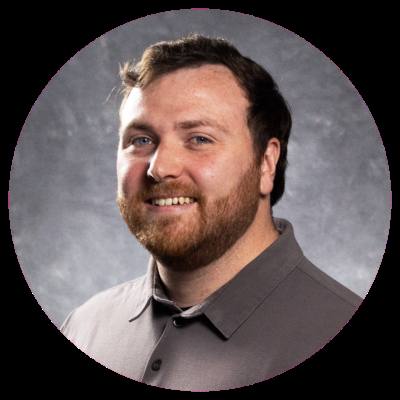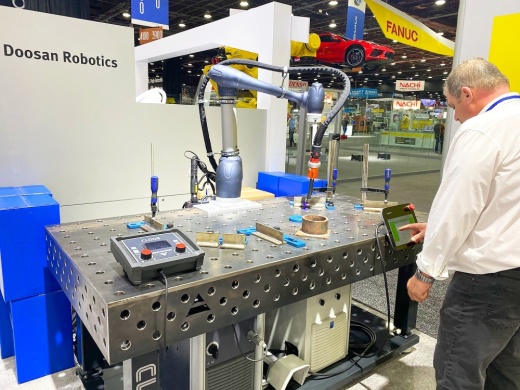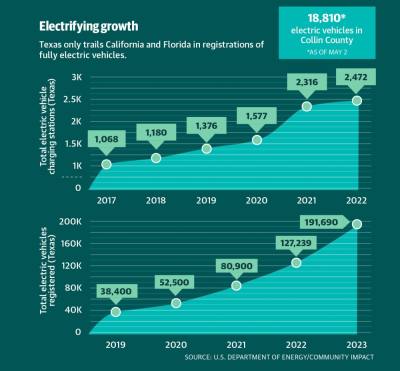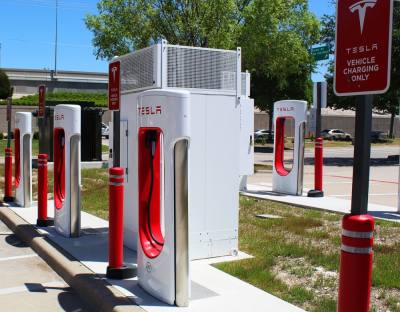Plano was the country’s fastest-growing city for tech jobs from April 2019-April 2020, according to data from labor analytics company Lightcast. The growth hasn’t been as rapid since, but the city’s tech industry has continued to flourish in recent years. The Lightcast data listed Plano as a top 20 city for tech jobs as of the end of 2022.
“We’ve seen a real uptick of interest in tech here in Plano over the last few years,” Plano Director of Economic Development Doug McDonald said. “I think that in Plano, we’re providing the quality of life that these companies are looking for.”Some of that growth can be attributed to the expanding footprint of international companies such as Samsung, Doosan Robotics and SK Signet—which opened an electric vehicle charger manufacturing facility in Plano earlier this year.
McDonald, Mayor John Muns, and other city staff and officials took a trip to South Korea and Japan in April to visit with some foreign companies that have a strong presence in the city.
Muns said building relationships with companies can lead to future growth, but the additional jobs are the most significant outcome from the recent tech industry boom. The SK manufacturing facility will look to create up to 183 jobs in the city, according to a release from the company.
“I think the end user for the technologies developed here is all over the world,” he said. “For Plano, I think the real benefit is jobs, and it’s a variety of different jobs. That really does enhance the attraction to come work and live in Plano at the same time.”
Doosan Robotics—a relatively new branch of the South Korean company Doosan Group—opened its U.S. headquarters on Legacy Drive last June.
The company focuses on “cobots,” or collaborative robots. These robots are made to function alongside humans—whether that’s performing dangerous jobs in an industrial space or making an iced latte.
“These types of robots are meant to help humanity, to do things where the task that humans are doing might be dangerous or dirty,” Doosan Robotics General Manager Alex Lee said. “Collaborative robots are basically bringing automation to the consumer. It’s no longer only inside of a manufacturing plant. ... I look at it as a major evolution when it comes to automation.”
And over the last several years, Plano has seen plenty of growth in the electric vehicle industry, according to the U.S. Department of Energy.
And as the use of electric vehicles rises, several charging companies are expanding their footprints in Plano. That includes Plano-based Universal EV, which is looking to expand its operation in North Texas.“There are a variety of different companies with an interest in coming to Plano,” Muns said. “The beauty of Plano’s business community is diversity in the types of businesses—we’re not just a one-trick pony. That variety even makes it that much more exciting.”
Rise of electric vehicles
SK officials said their move largely comes as a result of the massive growth in the use of electric vehicles and the need for electric vehicle chargers in the area.
Universal EV Chargers CEO Hemal Doshi said he caught onto that need ahead of time when he started driving an electric vehicle seven years ago.
“If we ever went out of town, we would have to call ahead and only stay at locations that have chargers,” he said. “Based on my own driving experience, I saw that this was an area of need.”
That’s when Universal, which previously only worked in solar technology, started developing electric vehicle charging stations. Universal has contracts to install chargers at over 1,000 hotels in Texas, and the company has over 2,500 planned installations in general.
While Doshi expected that growth in the industry would continue, he said it has far exceeded his expectations.
“Based on where we are right now, our 10-year projections will be squeezed into three years,” Doshi said.
The number of electric vehicles on the road in Texas had hit 191,690—18,810 of which are in Collin County—as of May 2, which is up from 11,900 in 2016, according to the Department of Energy.That growth has only exacerbated the need for more chargers in Texas—there were 2,472 charging stations in the state as of December.
“There’s a huge gap in the North Texas, West Texas Panhandle, New Mexico, Colorado, Oklahoma areas,” Muns said. “It’s amazing when you look at the map, and there’s just this huge, vast wasteland with no battery chargers.”
To help address the need, SK’s manufacturing plant is planned to produce up to 10,000 fast electric vehicle chargers per year once it’s running at full capacity in July. Universal EV also offered no-cost chargers to Texas businesses through March to help build up the network.
With initiatives such as the new tax credit offered for those who purchase electric vehicles as well as the overall cost of owning an electric vehicle becoming more affordable, Doshi expects the growth to continue.
“I could hardly see electric vehicles seven years back; now you cannot go to an intersection without seeing an electric vehicle,” said Doshi, who has lived in Plano for 25 years. “That number is growing exponentially. The growth is there, and that growth is not going to slow down.”
Why Plano?
For foreign tech companies such as Doosan and SK, Plano provides a number of inherent advantages.
The proximity to the Dallas Fort Worth International Airport eases the travel burden, for one. And as companies such as Samsung and SK move to Plano, the city is garnering a reputation overseas.
“Word of mouth gets back to the companies overseas that say not only is this a business-friendly environment, but Plano also makes it very easy for us to transition into the United States,” Muns said.
Plano officials said they put in work to maintain that relationship.
“We build these strong relationships so when a company from Korea is looking to come into Texas, they can see, ‘OK, there’s Samsung; there’s SK; and there’s Doosan. There’s a collection of Korean companies. Now there must be something good with this community,’” McDonald said.
And despite the fact Plano can’t always offer the largest incentive package for prospective companies, McDonald said other factors make the city an attractive landing spot.
He said the proximity to huge companies such as Toyota and Samsung is a benefit for smaller partners, as is the workforce coming from local universities such as Collin College and The University of Texas at Dallas along with the Dallas Area Rapid Transit network.
The main incentive Plano offers is collaboration with the companies, according to Plano Economic Development Manager Esmeralda de la Cruz.
“We’re always trying to figure out what their needs are,” she said. “If they have concerns about any particular aspect of the business, we try to make sure that we can connect them with resources that are already here.”
It was a combination of those factors that made Plano the right fit for Doosan, Lee said.
“When you put it all together, we’re going to have access to great talent; we’re going to have easy access to be able to fly just about anywhere, and [Plano] seemed like a great place for people that wanted to start a family to live—everything just kind of gelled,” Lee said. “It doesn’t hurt that when I look out my window, I see the Toyota headquarters. That makes you feel like you made the right decision.”









